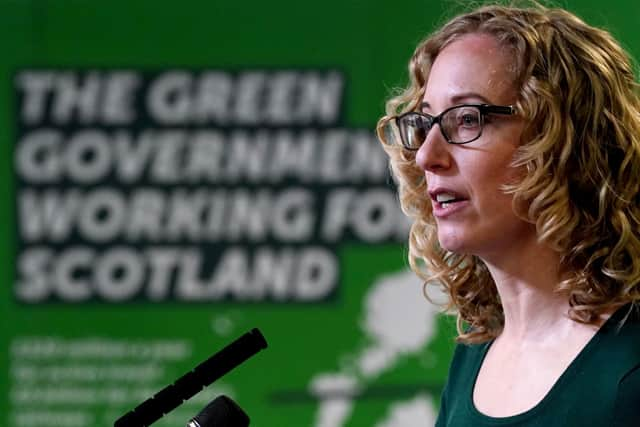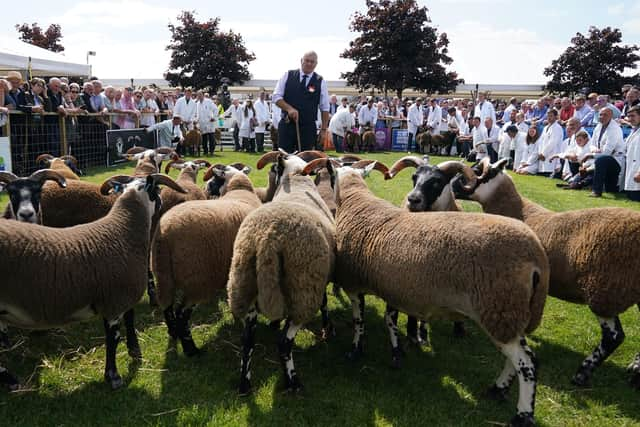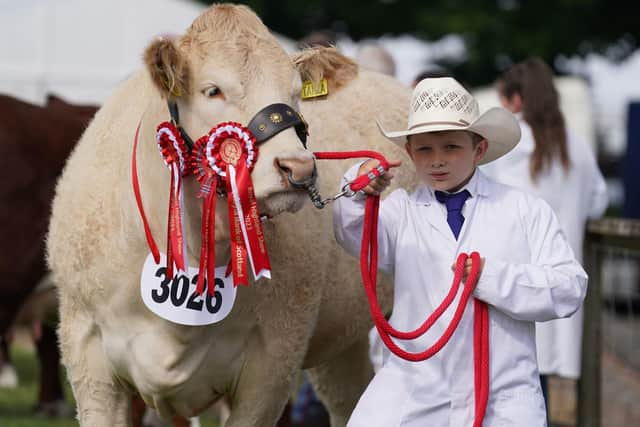Royal Highland Show: Farmers call for Scottish Government to control 'hardening' Green agenda
Farmers and crofters have called for the Scottish Government to control the “hardening of the Green agenda”, which they claim has destroyed industry confidence and threatens Scotland’s wider biodiversity.
In a press meeting at the Royal Highland Show, one of the biggest agriculture shows of its kind in Europe, the National Farmers Union Scotland made damning comments about the impact of Scottish Green decisions on the sector.
Advertisement
Hide AdAdvertisement
Hide AdLeading representatives of the union, including president Martin Kennedy, said since the Bute House agreement where the SNP joined with the Greens, confidence in the Scottish Government had plummeted.


Mr Kennedy said: "We used to be very aligned with the Scottish Government and with NatureScot. We felt we were on the same page. We wanted to do things for the climate, do things for biodiversity.
"But the hardening of the Green agenda since the Bute House agreement, the pendulum has swung in completely the wrong direction.
"Things have gone far too far, to the detriment of biodiversity itself. We have lost the confidence now.”


Mr Kennedy said the Scottish Government’s recent decision to ban the use of Asulox, a herbicide that has been used in the UK over the past decade to control bracken, and which has been permitted in England, has weakened confidence further.
On Wednesday the Scottish Government said that, for the first time, the Health and Safety Executive (HSE) had recommended refusing the pesticide’s use in 2023 to all four UK nations.
Mr Kennedy said the decision was “absolutely shocking”, and stressed the union had called for it to be urgently reviewed.


Farmers insist bracken is a haven for ticks and therefore the spread of the weed brings with it a risk of tick-borne diseases like Lyme disease and Louping ill.
Advertisement
Hide AdAdvertisement
Hide AdThey require Asulox for aerial spreading to target hillside land that is too difficult or in some cases too dangerous to reach by vehicle.
Scotland secretary Alister Jack said Scottish ministers made “absolutely the wrong decision” on banning the chemical. "It’s politically a very bad decision as far as farmers are concerned,” he said.
Mr Kennedy also raised concern over species management plans under the Scottish Greens, claiming there was little to no effort or funding to protect farmers with the likes of the beaver and sea eagle populations increasing.
He said farmers were having to spend tens of thousands of pounds to keep their businesses going while facing repeated damage year on year from some of these newly introduced species.
"The impact some of these animals on farmers is not understood by the Greens at all,” he said. "The Greens do not understand the mental impact their decisions are having on people who are working in the hills, trying to keep breeding flocks alive, growing food… there needs to be a shift, otherwise there will be no confidence left.”
The NFUS has called for a stand-alone fund – separate to the agriculture fund – to help farmers mitigate the damage caused by some reintroduced species, or for there to be a more “pragmatic licensing system for lethal control to reduce the number of animals having that impact”.
Co-Scottish Greens leader Lorna Slater speaking at a Soil Association event at the show said the "farming versus environment conversations" need to end.
She said both ways of managing the land need to flourish, adding the Bute House Agreement can deliver on that.
Advertisement
Hide AdAdvertisement
Hide AdEarlier, rural affairs secretary Mairi Gougeon opened the Royal Highland Show with a speech giving more detail about the future farming support system that will come once the existing Brexit system runs out next year.
Her announcement included more conditions that farmers and crofters would have to meet to be eligible for payment to support their businesses. These include protecting wetland and peatlands if such habitat is on their land, and for all farmers and crofters to carry out soil tests.
Her update, however, failed to include further details on how the scheme will be funded, clarity the NFUS has been urgently calling for as members remain in the dark about what financial support will be available beyond 2024.
Ms Gougeon said further funding detail was “entirely dependent on the UK Government” and she “has no idea” what Scotland’s budget would be beyond 2025.
However, Mr Jack dismissed Ms Gougeon’s claims.
He referenced the record bloc grant funding given to Scotland to cover devolved matters, adding: “The Scottish Government receives this funding. It’s up to them how much they then allocate to agriculture, so the responsibility lies with them.”
Comments
Want to join the conversation? Please or to comment on this article.
